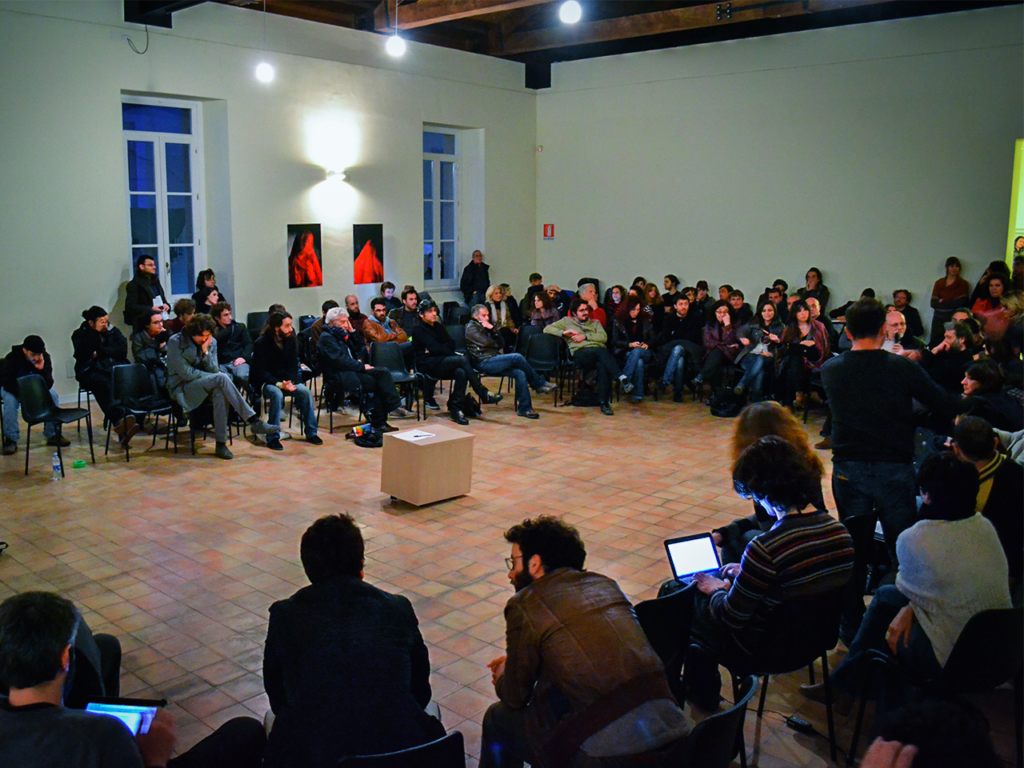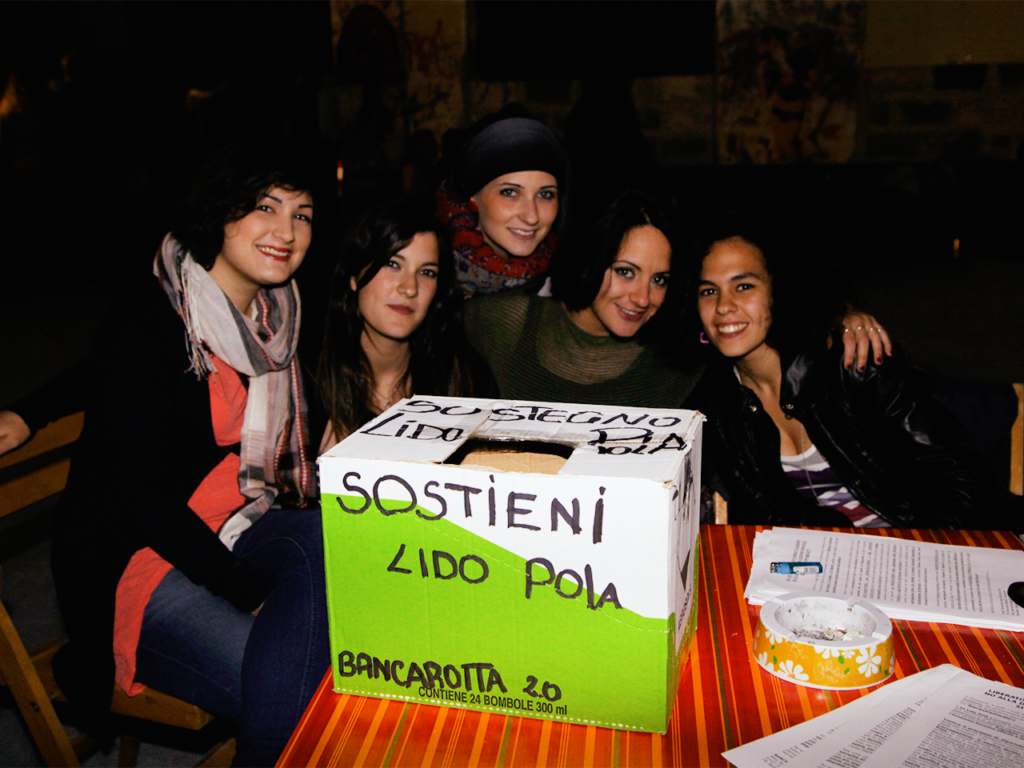A commons cannot be separated from the existence of a community that emerges and responds to the widespread need to take care of a space that is perceived as underused (e.g. there cannot be a commons that is cared for by one individual). The community regulates the temporary use of a space that remains public property, as do the extraordinary maintenance costs and the living costs (e.g. utilities, caretaker). With an act of civil disobedience, from a ‘no’ constructive and non-destructive, individuals act autonomously and politically to try to change what they do not approve of about their territorial realities. It is, therefore, an act of revolt against a status quo, an order of things that one intends to change, not for oneself, but for those with whom one shares that time and space. In this sense, it embodies the Camusian phrase that underlies many civil and political activists: ‘I revolt, therefore we are’. Declining one’s freedom not in an individualistic and atomising way, nor passively, but as the freedom to participate, to be active, to act, and to unite in community interferes in the dynamics one does not share about how one’s world is organised and hetero-directed.
The principle of care
The principle of care is central to the experimentation of the commons and is expressed as care (reciprocal and widespread, never delegated to others) of the commons (not for oneself but for all in that it does not belong to anyone but is common to all, even to those who are yet to come), as care of those who are part of or cross the community and the space of the commons, cooperating in forms of direct democracy, opposed to the competitive mechanisms typical of today’s society, which are increasingly based on individualism, the separation of knowledge, a non-organic vision of the individual, based on the overpowering and prevarication of others rather than on the exaltation of their free expression. For this reason, the cardinal principle of the commons is the rejection of any form of racism, sexism, fascism and any other kind of discrimination that would limit the welcome and exclude someone else from using and crossing the common good. The commons arise from the need to do things together, to have spaces in which it is possible to trigger unprecedented encounters between different social groups, with different ideological affiliations and different values, but united by the shared need to care for each other, in a vision of the human being as an eminently relational creature, linked to its fellows by the interdependence that sees them connected and united. Cultural otherness is therefore, guaranteed in the practices of the commons, which preserve it by conducting their experiments always safeguarding the principles of inclusion, of free crossings, of welcome, not being indifferent to others, but being indifferent to different affiliations, heritages, origins, cultural and confessional diversities.

The principle of inclusion and the active freedom of com-participation
Care is understood as a consequence of being interested in the fate of the other, in feeling part of the fate of anyone who is other than oneself and therefore, sharing and com-participating with them as an integral and indispensable part of one’s own well-being. It is a care that derives directly from the ‘I care’ that Don Milani placed at the entrance to his classroom, in the school of Barbiana. This was in response to the menefrego fascist-style, which through the dehumanisation of individuals allowed for their discrimination and deprivation until they were considered as a foreign body in society. By including the interest of all in one’s own, it is the change of values that is implemented in the emerging communities of an urban commons. Thus, once any civil action that is to be undertaken and activities put in place, it guarantees the maximisation of the interest of all, and therefore of everyone. It is a way of understanding social life and also the pursuit of one’s own happiness, in union, and never in opposition, to that of all. It is in this sense that a commons pursues the common good, driven by the awareness that one cannot do one’s own good if one does not also pursues the god of the others. So, conditions of the other not only touch our own, but undermine them, since the fates of all are bound together. Therefore, in a commons no one can be excluded under any circumstances, unless they are being exclusionary, and there can be no such thing as differing, disapproved of, or side-lined. Adhering to a commons means understanding that there is no such thing as a private interest, nor is there such a thing as a good that can be separated from the collective good, and that happiness can be obtained by putting in common and sharing resources. Through the encounter with others, I am able to learn about their interests, culture, values and needs, and so I am able recognise my own. I recognise that we are not but that we intersect and I can exercise empathy and sympathy that allow us to experience our relational nature and form an interdependent community that practices sharing.
The assembly
All commons have this moment. It is during the assembly that the entire community gathers to meet, to open up and to participate in the decisions that govern the use of the space. The assembly is the beating heart of a commons. The assembly is where the various parties have the opportunity to meet and get to know each other, regardless of their specific interests and values. The assembly, in practice, is where all together decline their freedom that is not passive and individualistic, but collective, widespread and active, in which we take on our responsibilities towards each other. When we sit in a circle in the assembly, we take care to listen to others and welcome them into the community that will be built together. It is during the assembly that social relations are woven, that is the living substratum that is the sap of a commons. It is also the political moment in which one meets to be able to better communicate and share one’s self externally and, by getting together, trigger new practices and synergies. The political moment it is not to be endorsed or approved, or to account for one’s own crossing and use of the common goods, or to proselytise and indulge in narcissistic and self-referential exposition of one’s opinions, as in a talk show. The assembly must always be free and open for anyone to go through at any time, and the decisions, as well as the convocation, communicated in a transparent way. It should be convened at least once a month, unless otherwise provided for, it is informal, and the tension that runs through it is that of active listening aimed at the widest possible participation. During the course of the meeting, activities can be scheduled to ensure an alternating use of the facilities and individual spaces, and set up thematic tables to which to refer (see “what we do”), as well as welcoming proposals and initiatives from those who are approaching, for the first time, the use of that commons (which will always be accepted, where there are the necessary forces, space and time and if they are not exclusionary or violate the principles of anti-fascism, anti-sexism and anti-racism).

Self-government: the consensus method
Unlike the way the world is organised, the decision-making assembly of a commons does not pursue effectiveness and efficiency in decision-making (on the contrary), but aims at including and resolving possible conflicts, and balancing individual and private interests in favour of the common interest, shared and more widely spread. In order to do this, every decision is taken without resorting to voting or majority systems, but is discussed until all the components of the assembly agree on an issue, on which, in any case, it is always possible to return to discuss, at any time, in the future (i.e. in the commons as in the assembly, the majority does not win, because no one wins and, above all, no one loses, ever, but everyone decides together, always). This method guarantees the minimisation of dissent, so as to arrive at a decision that is as unanimous and shared as possible, always to guarantee a free and ample exercise of decision-making freedom that is almost capillary. Given that the community of a common good is not formally constituted, is not defined, nor is it given, but is in a continuous state of becoming, together with the method of widespread consensus, it is not possible to attribute responsibility for the use of a commons to a single individual.